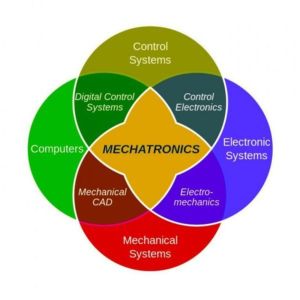
For years, Virginia Western Community College Automated Manufacturing Instructor Dan Horine has been searching for more affordable equipment to teach mechatronics in high schools. By the end of the Mechatronics Community Exchange (MEC) call on Friday, October 27, he was persuaded that the Low Cost Mechatronics Trainer built by Anne Arundel Community College Associate Professor Tim Callinan could be what he's been seeking. "It's amazing," Horine said.
The trainer Callinan built for Team CollaborATE—an ATE project that involves Anne Arundel, College of Lake County, and Florida State College at Jacksonville—costs about $1,500 and can be used simultaneously by two students in a lab. The $7,000 cost of comparable commercial equipment has inhibited expansion of mechatronics programs at high schools and colleges. Team CollaborATE provides detailed instructions to build the trainer, which uses mechatronics' key electrical, mechanical and computer technologies.
Watch the video that Callinan narrates at https://www.youtube.com/watch?v=JBGCg_1LQHw. Listen to the recording of the Skype group discussion about the trainer at https://ate.community/MCE, the Mechatronics Community Exchange microsite that ATE Central hosts for this group of ATE educators.
ATE Central's Microsite Service is free to all ATE centers and projects. Its drop-and-drag interface is easy to use and accommodates photos and multi-page documents. To begin the process of creating a microsite send an email to microsites@atecentral.net.
Not all of MEC's monthly one-hour calls result in "eureka" moments, but since 2015, instructors from 22 colleges have voluntarily joined in the community of practice discussion as their schedules allow.
"It keeps us rejuvenated," Horine said.
Horine serves as moderator of the calls, which his Partnership in Advanced Career Education in Mechatronics Engineering project co-hosts with the Florida Advanced Technological Education Center of Excellence (FLATE). FLATE keeps the participant database and maintains the archives of the recorded MEC calls, which have been conducted using Skype. The College of Lake County recently added financial support for MEC from its Team CollaborATE grant.
Many of the MEC sessions have had agendas, as the Oct. 27 call did when participants were asked to review Callinan's video in advance and give him feedback. But the gestalt of the MEC is informal so that participants feel free to talk about what's working and not working in their programs. Student recruitment, retention, and math preparation are frequently discussed. Occasionally instructors "walk" MEC participants through their labs using laptop cameras to obtain advice about equipment utilization and pedagogy.
FLATE Principal Investigator Marilyn Barger says it is important to provide a professional network for mechatronics educators, who are often the only persons at their colleges teaching the combination of technical skills involved in advanced manufacturing and robotics. Establishing a self-sustaining community of practice has become especially important as colleges' budgets for professional development shrink.
"My goal is to build capacity in the young grantees—to help them build their programs, to give them a platform to interact and share. Most of them are one-man shows: a single faculty [member] with a couple adjuncts in their own colleges, so they don't really have other educators in their own area to work with," Barger said.

 Subscribe
Subscribe


 See More ATE Impacts
See More ATE Impacts

Comments
There are no comments yet for this entry. Please Log In to post one.